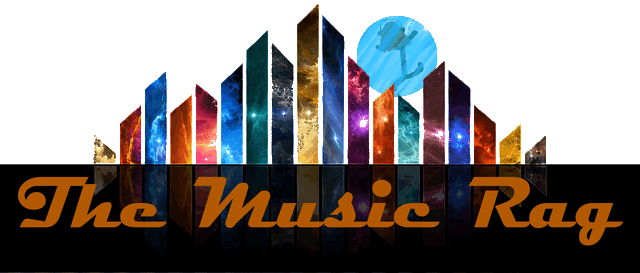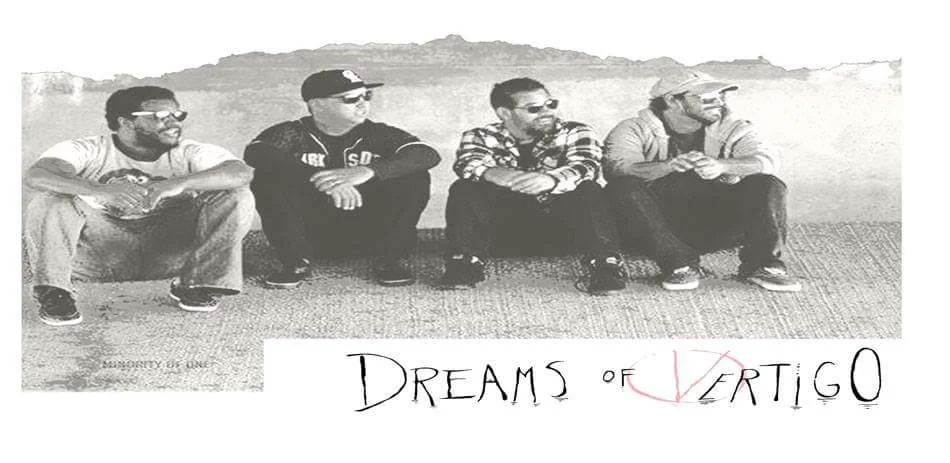Catch up with pop/punk rockers Dreams of Vertigo's Doug Ferguson, watch the new video for"Blakey's Goldfinger", and look for Reject University Part 2 to be released later this year.
What brought the band together?
Doug Ferguson: It's actually funny, we call ourselves - the piracy of our own practice - the Craigslist band. I started the band in early 2012 around February/March and we ended up finding our guitarist through Craigslist. We started as an acoustic project but we knew that we wanted to branch out and do some more full band stuff, so that's when I started to put out the ads. I put out the ad for another guitarist, found another guitarist and then he found a bass player, probably two years later - it took us a long time to find a bass player - but we found a bass player through Craigslist and, eventually, found a drummer and parted ways with him and then we got another drummer, again, through Craigslist [laughs]; you can see the trend. Then actually what happened is our other guitarist, Devon, he ended up moving to the East coast and so we needed another lead guitarist and we ended up finding a guy named Joe, who is our bass players really good friend and he was actually a singer in one of his other bands. That's how it started and we've been doing that since about 2013/2014.
Where does your name, Dreams of Vertigo, come from?
I've always been absolutely fascinated with dreams. I've always been the type of guy that has these very interesting dreams and I've always been - even as a kid - been like, okay, what in my mind led me to have a dream such as whatever it was? I kept having these vertigo dreams and, if you're not familiar, I tell people it's like, [laughs] when I was sleeping in class in high school, I would drift away and then I would feel like I was falling, and those are called vertigo dreams. I started looking some stuff up about vertigo dreams and basically you tend to get those when you're under a tremendous amount of stress, going through lifestyle changes, et cetera, et cetera. At the time there was a lot going on: I was in a really bad car accident, I had broken up with my girlfriend, I had moved out of my house, I'd had a really big argument with my best friend, and there was all this stress and pain and drama going on in my life at the time and I kept having these vertigo dreams. One day I was at work and I worked security at a concert venue and we were up on the roof and I looked down and I got this vertigo and I literally just looked to one of my co-workers and I was like, 'hey, I should start a band called Dreams of Vertigo,' and that's how it started.
Which bands or artists have you been influenced by?
Honestly, we're influenced by a lot of bands, whether they're influencing us musically or just in how they carry themselves. Musically, we're definitely influenced by bands like Green Day, Metz, Blink-182 and NoFX, those type of bands, because we grew up in the So-Cal punk scene and are influenced by a lot of those bands. We're also influenced by bands like Avenged Sevenfold - who don't really sound anything like us in any way - but bands like Avenged Sevenfold are bands that do things on their own terms, they make music just basically, I don't want to say in a selfish way, but they make music that they enjoy listening to, without any so-called labels, as far as genres go. They don't sit there and write, 'let's write a punk song' or 'let's write a pop song' or 'let's write an acoustic song' or whatever, and we really look up to bands like that because they've done things on their own terms and that's very much how we are. We're a very DIY band and everything that we've accomplished we've worked our asses off to get so we have a lot of respect for bands like that, too. We listen to them too, obviously we love their music, but I wouldn't say that people that listen to Avenged Sevenfold also listen to Dreams of Vertigo [laughs].
Who's in your playlist now?
I'm into a lot of local bands. I've been working in the music industry for awhile, doing artist development and I'm a music producer, so I like a lot of local bands. There's bands like Assuming We Survive and Haster - who are just absolutely amazing musicians and they've helped us out. But I would say, as far as bigger artists, if you went on my Spotify playlist, it's literally everything from The Beach Boys to Green Day to Metz to Avenged Sevenfold; [laughs] it's all over the place. I just love music in general and I love artists that are completely honest with themselves, so that's what I gravitate towards. And a band with a good melody, I like that, too.
What words would you use to describe your sound?
We joke around and tell people that we're sell-out punk [laughs] but we're a punk pop/alternative band, I would say. Like I said, most people that enjoy us also like the So-Cal punk scene and the '90s rock scene and bands like Green Day, NoFX, and Metz, and stuff like that. But, like, right now, we're working on a new record and it's completely different from the last record, so it's really hard to, quote unquote, pigeonhole Dreams of Vertigo into a distinct sound because we're forever changing. I grew up in the So-Cal punk scene and our drummer's a hip hop drummer, so really, genre is a 4-letter word in the band [laughs].
What was the inspiration for your song and new skate video for "Blakey's Goldfinger"?
"Blakey's Goldfinger" was one of those songs that we wrote that we never really had any intention of releasing. It was a song that we would jam out to. I just came up with this ska/punk riff one day at practice and we just went with it and then we placed it on the back burner because we had a lot of shows coming up and we were doing a whole bunch of other stuff and we just weren't really focusing on working on new material, at the time. Then, our guitarist, Devon, who we called Blakey - his middle name was Blake, so we all called him Blakey - he sent us all a message on Facebook and said that he was moving to the East coast and he was going to have to leave the band, which was definitely a huge step back for us, because he wasn't just the guitarist for us, he was our brother, he was one of the founding members of the band, so it was definitely a big shock for us. We did a couple shows on our own, just as a three piece, but it just wasn't the same and my friend, Paul Miner, approached me and he's worked with Thrice and New Found Glory and a bunch of really cool bands that we're really influenced by and he said, 'hey, do you guys have any new songs you wanna record, I wanna start recording some new bands and I really like your sound,' and I was like, 'okay' [laughs]. He ended up going on tour for about a month and a half so we were sitting in there, doing some pre-production, trying to figure out what song to do, and we just kept going back to "Blakey's Goldfinger".
I think at the end, we decided to record it because we looked at it as a transition song, because it's not really related at all to the new record that we're working on. It's something totally different that we've never done before and, lyrically, it was one of those songs where I had every intention of writing it about something else, but every time I looked at the lyrics, I was writing it about my bandmate, about my brother that had left the band and how it affected us all. It was really a natural process but, at the same time, we didn't have any intention of ever showing it to anybody. And, the obvious influence of goldfinger is in there, with the title, and we all skate and enjoy going out and having fun, so the idea of having a video with a skater was completely natural. This is what we'd be doing anyway, if a band released a song and we liked it, we'd be skating to it so it was just a natural process like, 'hey, let's release a video where there's a skater and jam along to it,' so it was a really fun process to film the video.
Can you tell us anything about Reject University Part 2?
Right now, we're basically in the recording process of it. We had practice yesterday and we have a ton of songs that are pretty much ready and it's pretty much done musically, it's just a matter of getting into the studio and making the time to go in there and actually record the songs. As of right now, we're hoping to have Reject University Part 2 done and out by the end of Summer/early Fall.
What do you want your listeners and fans to take from your music?
Honestly, our fans are amazing. They've stuck by us since day one and I think one of the things that we want our fans to know is that we definitely appreciate that loyalty, but every record that we release is going to be different. Reject University Part 2 is going to be totally different than Reject University Part 1, and I'm assuming Reject University Part 3 is going to be completely different from Part 2, so we honestly just want to create the best music that we're capable of making and continuously challenging each other, as musicians and as individuals, to create better music and we hope that our fans stick around and enjoy what we're making.
Is there anything you'd like to add?
Just that our fans really are - as cliché as it sounds - our fans really are our world. I started this band as an acoustic project in 2012 and, literally, there were three people watching our shows and, to be able to come from that, go through all of the stuff that we went through, both good and bad, opening up for bands like Eve 6 and losing Devon as our guitarist, our fans have stayed so loyal it's so amazing. I can't even put into words how much I appreciate all the love and support that our fans have given us and they've saved us, as musicians and as people in general; to know that there's someone out there, even if it's one person that you see that's singing your lyrics to the song that you're on, it's just the most amazing feeling and we absolutely, 100% appreciate all of the support.







